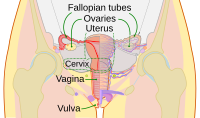
Photo from wikipedia
To determine cervical cancer risk associated with contemporary hormonal contraceptives, we conducted a cohort study of women aged 15 to 49 living in Denmark from 1995 to 2014, using routinely… Click to show full abstract
To determine cervical cancer risk associated with contemporary hormonal contraceptives, we conducted a cohort study of women aged 15 to 49 living in Denmark from 1995 to 2014, using routinely collected information about redeemed prescriptions, incident cancer and potential confounders. Poisson regression calculated adjusted cervical cancer risks among different contraceptive user groups by duration of use, time since last use, hormonal content and cancer histology. During >20 million person‐years, 3643 incident cervical cancers occurred. Ever users of any hormonal contraceptives compared to never users had a relative risk (RR) of 1.19 (95% confidence interval [CI] 1.10‐1.29). Increased risks were seen in current or recent users of any hormonal: RR 1.30 (95% CI 1.20‐1.42) and combined: RR 1.40 (95% CI 1.28‐1.53), but not progestin‐only contraception: RR 0.91 (95% CI 0.78‐1.07). Current or recent users of any hormonal contraception had an increased risk of both adenocarcinoma (RR 1.29, 95% CI 1.05‐1.60) and squamous cancer (RR 1.31, 95% CI 1.19‐1.44). The risk pattern among any hormonal and combined contraceptive users generally increased with longer duration of use and declined after stopping, possibly taking longer to disappear among prolonged users. Combined products containing different progestins had similar risks. Approximately one extra cervical cancer occurred for every 14 700 women using combined contraceptives for 1 year. Most women in our study were not vaccinated against human papillomavirus (HPV) infections. Our findings reinforce the urgent need for global interventions such as systematic screening, treatment of cervical intraepithelial neoplasia and HPV vaccination programmes to prevent cervical cancer, especially among users of combined contraceptives.
Journal Title: International Journal of Cancer
Year Published: 2021
Link to full text (if available)
Share on Social Media: Sign Up to like & get
recommendations!